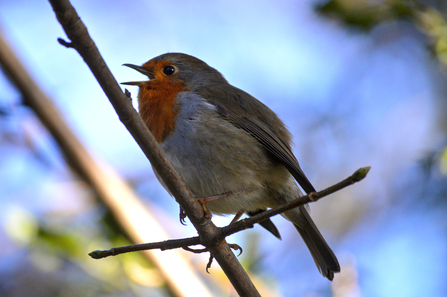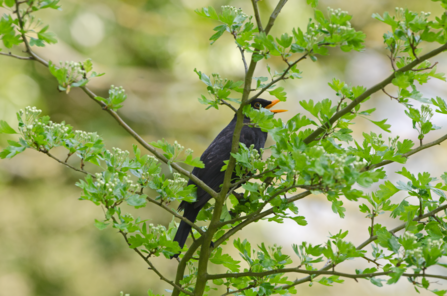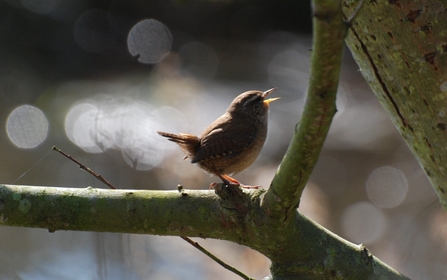Increasing daylength as we head towards the spring equinox triggers hormonal changes that turn our songbirds’ thoughts to the coming breeding season. Territories must be re-established and defended, and a mate must be found. Only the feisty robin perseveres with his choral performances throughout the dark, winter months. Other birds have saved their energy, concentrating on survival during this challenging time of the year.
Return of the dawn chorus
Mark Hamblin

Robin - Laura Cronin
Whilst the February dawn chorus may lack the volume and richness of one in May, the compensation is that dawn comes so much later at this time of year. No need for that frighteningly early start!
I was first alerted to the return of this wonderful spring phenomenon last week. Still in bed, the unmistakable repeat-phrasing of a song thrush was audible even through the double-glazing. Opening the window an inch or two (it is still quite cold in the early mornings after all), I could hear that his lone voice, projected from a well-chosen perch with all the skill of a trained opera singer, was soon to be accompanied by one, no, two, blackbirds. Their baritone melodies chiming beautifully with his proclamations.

Blackbird - David Tipling/2020VISION
It was about 45 minutes before sunrise, the sky already beginning to lighten and the background noises of humans and their machinery not yet active to spoil the performance.
The explosive shout of a wren, for it can hardly be called a song, was now hurled into the mix. How can such a tiny bird, weighing no more than a pair of cufflinks, produce such an impressive noise? Gradually, other birds started to join in; a pair of collard doves, cooing their dot-dash-dot semaphore messages to each other, the deeper, growly call of the wood pigeons, and the occasional throaty chuckle of a jackdaw.

Wren - Stewart McDonald
As the sky took on the golden and rose hues of a fine, February morning, the songsters gradually departed to start their day’s foraging. After all, it wouldn’t do to remain so conspicuous once the day-time predators have full use of their acute eyesight. Besides, as the daylight fades once more into evening, there will be another opportunity to re-ignite the performance.
And so, the dawn chorus will continue until all these avian choristers have secured their territory, found a mate, built a nest and produced a clutch of eggs. Then, the energy invested in self-promotion will need to be transferred into child-rearing, with the long days of summer spent foraging for feed to raise their chicks. But, until then, I urge you to open the bedroom window for a few minutes at the start of your day and enjoy one of nature’s finest gifts to us. British songbirds really are wonderful.
- Sue Huggett, Campaigns Volunteer

